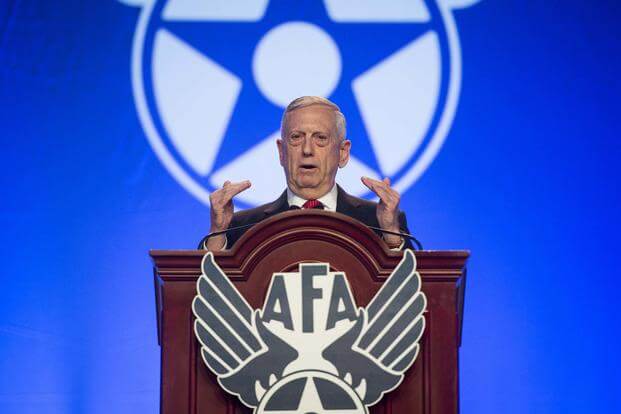NATIONAL HARBOR, Md. -- The U.S. strategy in the Middle East cannot be the same, linear approach it has been for almost 20 years, Defense Secretary Jim Mattis said Wednesday.
Mattis, who took the stage at the Air Force Association's Air, Space, and Cyber Conference, addressed hundreds of airmen who had supplied written questions in advance, including: "What does winning look like in the Middle East?" and "What's your take on North Korea, and how do we solve it?"
On North Korea, Mattis reiterated what for weeks has been the Defense Department's mantra: Diplomatic solutions are the way forward, even after that nation's recent missile tests and an alleged thermonuclear hydrogen bomb test.
However, "military options must be available to protect allies and ourselves," Mattis said.
Related content:
- 2017 AFA'S Air, Space & Cyber Conference
- Air Force Adds F-16s, Returns Tankers to Afghanistan, Generals Say
- Airman Who Staved Off Ambush in Afghanistan to Receive Air Force Cross
Regarding Iraq, Syria and Afghanistan, Mattis said fights are local. There is not just "one war" in the region.
"It may look the same to an airman overhead," he said, but there are vastly different policies in Syria and Iraq even as the U.S. maintains its air campaign to rid both countries of the Islamic State.
'We're Going to Crush ISIS'
"What we're going to do there is we're going to crush ISIS," Mattis said. "We have accelerated the fight. And the second change is -- both in Iraq and Syria, due to the danger of foreign fighters returning home -- we're going to reduce that number."
That means preventing those fighters from escaping a battle and moving into another region, he said.
Once ISIS "goes down," the U.S. can focus on maintaining relations with leaders in Baghdad to make certain "Iraq doesn't find itself with ISIS 2.0," he said.
In Syria, Mattis said the issue will move "toward Geneva," meaning international laws and peace talks will dictate the best relief for the Syrian people, who have been embattled since the start of the country's civil war in 2011.
"We'll move it into Geneva and work toward gaining some kind of stability there, the geopolitical heart of the Middle East," he said.
And in Afghanistan, with U.S. Air Force mentorship of Afghan air forces, "we'll mostly realign ourselves with train, advise and assist," to a point where the U.S. could leave them capable, Mattis said.
"By mentoring, we will get enough [Joint Terminal Attack Controllers] on the ground that NATO air forces can come in and support those folks who are fighting there -- something we have not been able to do in the past because we didn't have enough advisers," he said.
Mattis added, "Victory would look like the people and the government of Afghanistan can handle this threat."
Reflecting Different Cultures
He said he faces many concerns -- mainly, the continuing resolution and budget caps that have stifled the Defense Department for years -- but emphasized the importance of variety from each military service, especially going forward in uncertain global conflicts.
"I don't want the same policies in every service. I want different cultures to be reflected in your policy -- this is actually a strength to the Department of Defense … a spirit of collaboration," Mattis said.
"The ability to build trust in every chain of command and the ability to create harmony across the joint force is really what we're looking for in our leaders," he said, adding, "that includes with our allies and our Department of State allies as well across the river from the Pentagon."
He Isn't a 'Mad Dog'
Airmen had one more pressing question for the SecDef: "How did Mattis get his Mad Dog nickname?"
The retired Marine general said the moniker came from a slow news day, because his call sign is really "Chaos."
He didn't copy something out of Sun Tzu's "The Art of War," he said.
"It wasn't something dignified like that," Mattis said, adding he "always had good ideas -- at least I thought they were good ideas," and walking out of his operations officer's office one day, he noticed "Chaos" written on a white board.
When asked, the officer said, "It means the 'Colonel Has An Outstanding Solution.' "
"They didn't consider all my outstanding solutions," Mattis joked.
-- Oriana Pawlyk can be reached at oriana.pawlyk@military.com. Follow her on Twitter a @Oriana0214.






























